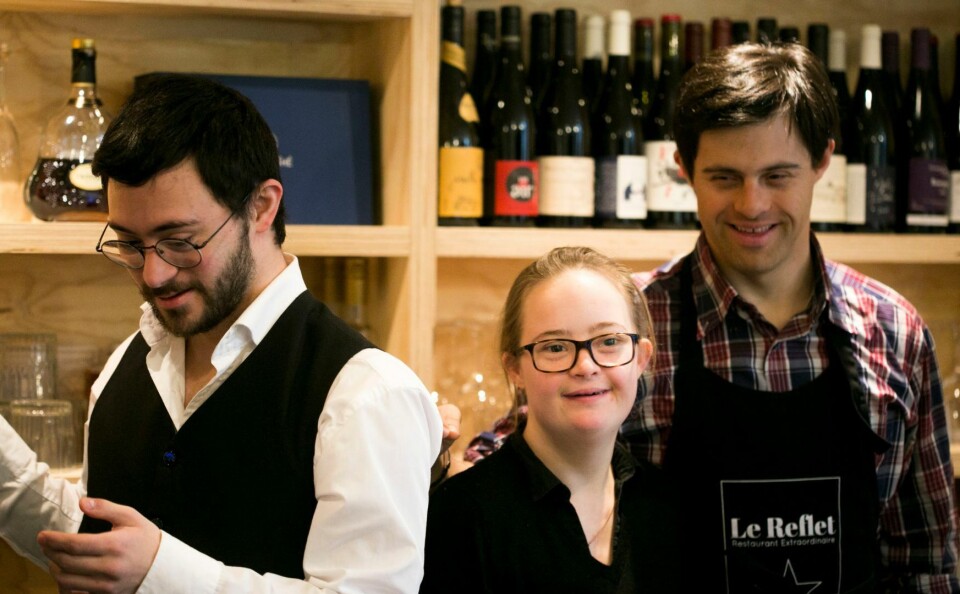-
French boulangeries demand right for staff to work on May 1 so they can open
Artisan bakery owners can work but employees cannot, while certain industrial bakeries are allowed to remain open with workers
-
The magic of mayonnaise: Why a homemade emulsion always woos guests in France
Plus, which shop-bought mayo brand is best?
-
Online ‘anti-waste’ supermarket offers deals on everyday items in France - we test it
Discounts of 10% to 50% available on brand products
French restaurant whose staff have Down’s syndrome sets global example
Most of the ‘extraordinary’ staff at Le Reflet in Paris and Nantes have the condition and work in the busy restaurants with a few simple modifications

On a quiet street in the bustling Marais district of Paris, Le Reflet is a trendy-looking restaurant like so many others in the area.
Through large glass windows you can see modern furniture, exposed brick walls, and serving staff setting out chic tableware for the lunchtime service.
Further back, steam rises from a kitchen busy preparing a colourful and seasonal menu.
There is one thing that sets Le Reflet apart from its neighbours: the majority of the restaurant’s staff have Down’s syndrome.
Extraordinary staff are independent
Down’s syndrome is a genetic disorder caused by the presence of an extra chromosome in the foetus.
It causes learning disabilities of varying severity, but does not exclude people with the disorder from learning new skills or bringing value to the workplace – something the restaurant is very keen to highlight.

Photo: Le Reflet
“Our staff are extraordinary,” floor manager Olivier says.
“The idea is to give them the opportunity to have a ‘normal’ job, in ordinary surroundings, to show that it is possible to do this kind of project with disabled people. They can work and be independent.”
Support from non-disabled staff
The eight staff members working at Le Reflet who have Down’s syndrome are all on permanent (CDI) contracts, with the only constraint being that they are part-time, working a maximum of 20 hours a week.
They are supported by non-disabled staff members including Olivier, head chef Sarah, pastry-chef Fabrice, and sous-chef Marie Lou.
Ibrahim is one of the most experienced members on the team and has worked at Le Reflet since it opened in October 2019.
“I like working on the floor, helping the chef and even doing the washing up,” he says.
“And I like the team here because everyone is nice and kind.”
Processes are simplified
Founder Flore Lelièvre opened the first Reflet restaurant in Nantes six years ago, inspired by her elder brother, who has Down’s syndrome.
In both the Nantes and Paris restaurants, there have been a few modifications to accommodate disabled staff.
There is a simplified ordering process as some floor staff cannot write down orders or find it difficult to remember them.
Instead, customers stamp a card with their choice of starter, main course and dessert, choosing from three options for each course.
“This means the staff can take orders autonomously,” Olivier says.
“The idea is that they learn their job, and can then do it independently.”
The order is then passed on to the kitchen, where the head chef Sarah delegates tasks as she sees fit.
“I know in the morning what needs to be done, so depending on the work we have, I have staff cutting and peeling vegetables, or something more technical and complicated.
“They cook hot dishes, when possible, but it can be dangerous, so I will always be next to them,” she said.
Photo: Le Reflet

New staff progress gradually to more complex tasks
In the two-and-a-half years she has worked in the restaurant, Sarah has witnessed staff members bloom professionally and personally.
“Their progress is amazing,” she says.
“Two staff members work in the kitchen, and they are extremely efficient now. They have picked up everything. Knowing they can do it gives them confidence too.”
Emile is one of the newest recruits, having joined the team last September.
He spends the morning setting tables and drying dishes, and when the lunchtime customers arrive, he helps serve alongside his colleagues Ibrahim and Ulysse.
He likes all the tasks he does at Le Reflet, but working in the kitchen is his passion. He is currently learning how to make main courses and desserts.
Staff learn communication and teamwork
Picking up these skills takes time. Many of the staff had already worked in other places before Le Reflet, but some had no prior work experience.
“It was difficult at first,” Olivier says. Training required a big investment of time and repetition that still needs to be maintained today.
“It took patience, and each staff member is different, but it was worth it. Now they can do everything on their own and I intervene as little as possible,” he says.
Beyond technical skills, developing communication and teamwork has been essential.
To an outsider, the way staff members interact with and help each other looks seamless, but it is the product of hard work and a close-knit team.
“At first, no one would speak to each other, but we really worked on getting them to work as a team,” Sarah says. “Now employees get coffees together, and they tend to help each other without being asked.”
Sarah, too, has learned new skills, such as the importance of giving precise instructions.
“They like to know exactly what needs to be done, because it is reassuring. Then, with time, they can do it perfectly,” she says.
The restaurant diversified after Covid hit
Like many restaurants, Le Reflet had to close in 2020 and 2021 due to Covid restrictions.
The team worried not just about the future of the restaurant but about the loss of contact and opportunities to practise skills that they had worked so hard to build.
In January 2021, they hit on an idea to keep working by preparing and serving subsidised healthy lunchtime food for students.
They charged a token €1 for the takeaway meals, which gave staff a chance to get back into the restaurant and also help their local community.
Read more: Paris restaurant offers €1 three-course menu to students
Since mid-May 2021, Le Reflet has been open as normal, serving lunches and dinners from Tuesday to Saturday each week.
As lunchtime approaches, the tables are set and tempting smells drift over from the kitchen. On the menu today are beef keftas, fish with aioli or stuffed Swiss chard leaves.
For dessert, there is tarte tatin, mango entremets or blood orange with basil and meringue.
The team is getting attention
Since reopening, the restaurant has also been garnering attention in some very high places.
Last year, former president François Hollande dined here, and posed for photographs with the team.
And on March 9, three members of Le Reflet’s table staff helped serve ministers for disability from 27 European Union member states at a dinner in Paris, held in honour of France taking over the presidency of the European Union Council.
There are currently no plans to open more branches beyond the two existing restaurants, but other projects are on the horizon.
Founder Ms Lelièvre has created an association called Les Extraordinaires, dedicated to helping different kinds of businesses integrate disabled workers into their staff.
A branch of the association called Les Brigades Extraordinaires is a collective of restaurants, including Le Reflet, that already employ disabled workers.
Together, they share best practice and advice from their own experiences with each other and new restaurants that want to do the same.
“We share all our tips and our struggles so we can help each other,” Olivier says. “We want to share the concept, and show that it is possible to do it.”
It seems Le Reflet’s message of inclusivity is spreading. “We now get calls from restaurants all over the world,” he says.
Related articles
French cinema finds way for deaf and hearing viewers to share films
Different but skilled: French caterers empower staff with disabilities
French firms given financial support to employ disabled workers
























